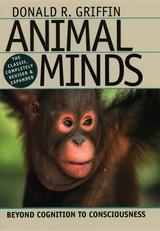
Animal Cognition presents a clear, concise, and comprehensive overview of what we know about cognitive processes in animals. Focusing mainly on what has been learned from experimental research, Vauclair presents a wide-ranging review of studies of many kinds of animals--bees and wasps, cats and dogs, dolphins and sea otters, pigeons and titmice, baboons, chimpanzees, vervet monkeys, and Japanese macaques. He also offers a novel discussion of the ways Piaget's theory of cognitive development and Piagetian concepts may be used to develop models for the study of animal cognition.
Individual chapters review the current state of our knowledge about specific kinds of cognition in animals: tool use and spatial and temporal representations; social cognition--how animals manage their relational life and the cognitive organization that sustains social behaviors; representation, communication, and language; and imitation, self-recognition, and the theory of mind--what animals know about themselves. The book closes with Vauclair's "agenda for comparative cognition." Here he examines the relationship of the experimental approach to other fields and methods of inquiry, such as cognitive ethology and the ecological approach to species comparisons. It is here, too, that Vauclair addresses the key issue of continuity, or its absence, between animal and human cognition.
Given our still limited knowledge of cognitive systems in animals, Vauclair argues, researchers should be less concerned with the "why" question--the evolutionary or ecological explanations for differences in cognition between the species--and more concerned with the "what"--the careful work that is needed to increase our understanding of similarities and differences in cognitive processes. This thoughtful and lively book will be of great value to students of animal behavior and to anyone who desires a better understanding of humankind's relations to other living creatures.


With this new edition of his classic book, which he has completely revised and updated, Griffin moves beyond considerations of animal cognition to argue that scientists can and should investigate questions of animal consciousness. Using examples from studies of species ranging from chimpanzees and dolphins to birds and honeybees, he demonstrates how communication among animals can serve as a "window" into what animals think and feel, just as human speech and nonverbal communication tell us most of what we know about the thoughts and feelings of other people. Even when they don't communicate about it, animals respond with sometimes surprising versatility to new situations for which neither their genes nor their previous experiences have prepared them, and Griffin discusses what these behaviors can tell us about animal minds. He also reviews the latest research in cognitive neuroscience, which has revealed startling similarities in the neural mechanisms underlying brain functioning in both humans and other animals. Finally, in four chapters greatly expanded for this edition, Griffin considers the latest scientific research on animal consciousness, pro and con, and explores its profound philosophical and ethical implications.

Scientists have long counseled against interpreting animal behavior in terms of human emotions, warning that such anthropomorphizing limits our ability to understand animals as they really are. Yet what are we to make of a female gorilla in a German zoo who spent days mourning the death of her baby? Or a wild female elephant who cared for a younger one after she was injured by a rambunctious teenage male? Or a rat who refused to push a lever for food when he saw that doing so caused another rat to be shocked? Aren’t these clear signs that animals have recognizable emotions and moral intelligence? With Wild Justice Marc Bekoff and Jessica Pierce unequivocally answer yes.
Marrying years of behavioral and cognitive research with compelling and moving anecdotes, Bekoff and Pierce reveal that animals exhibit a broad repertoire of moral behaviors, including fairness, empathy, trust, and reciprocity. Underlying these behaviors is a complex and nuanced range of emotions, backed by a high degree of intelligence and surprising behavioral flexibility. Animals, in short, are incredibly adept social beings, relying on rules of conduct to navigate intricate social networks that are essential to their survival. Ultimately, Bekoff and Pierce draw the astonishing conclusion that there is no moral gap between humans and other species: morality is an evolved trait that we unquestionably share with other social mammals.
Sure to be controversial, Wild Justice offers not just cutting-edge science, but a provocative call to rethink our relationship with—and our responsibilities toward—our fellow animals.
READERS
Browse our collection.
PUBLISHERS
See BiblioVault's publisher services.
STUDENT SERVICES
Files for college accessibility offices.
UChicago Accessibility Resources
home | accessibility | search | about | contact us
BiblioVault ® 2001 - 2024
The University of Chicago Press









